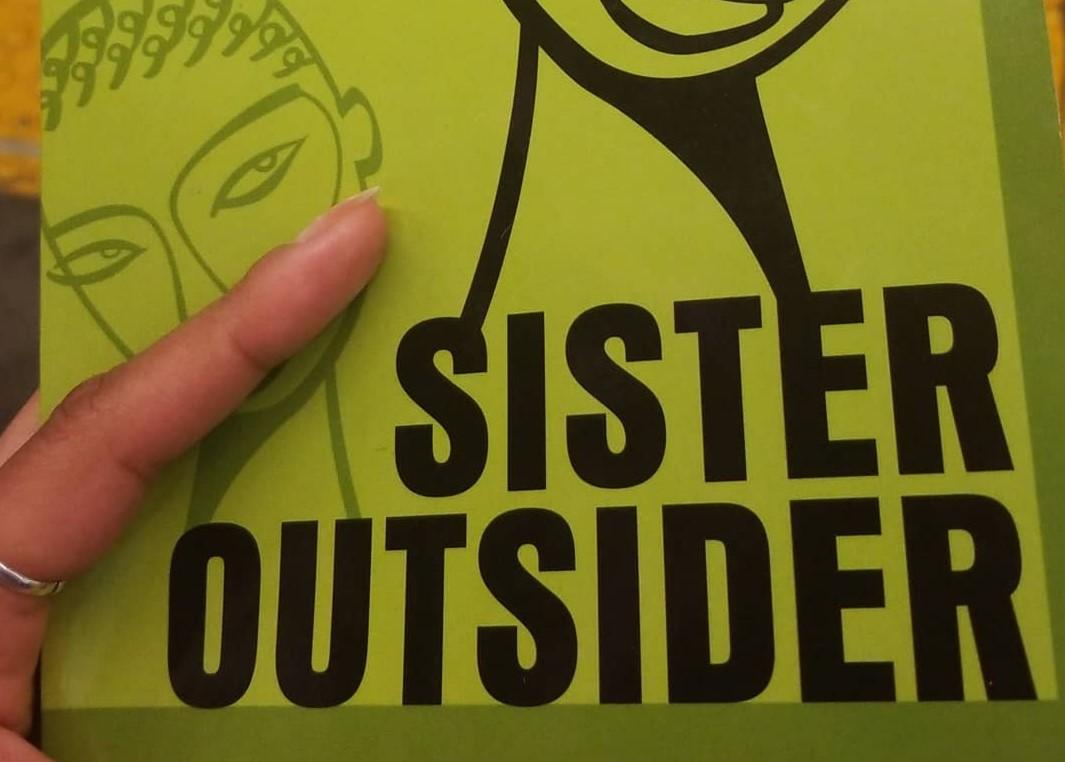How Reading Audre Lorde Helped Me Understand My Afro-Latina Identity

For the past four months, I’ve been reading Audre Lorde’s Sister Outsider. It’s now one of many pieces of work circulating across social media as one of the best anti-racism guides. Many allies are reading up on countless articles and picking up these go-to books to educate themselves on race. As a straight, Afro-Latina who picked up this book months prior to the uprisings and without any knowledge of who Lorde was at the time, I wanted to dive into Black [lesbian] literature.
Even though I’m a brown-skinned Latina, I can never experience the same injustices as Black people. Whether I pass as Black or not, does not change the fact that I am an ally who needs to be educated. “Ain’t I Latina?” founder Janel Martinez, is a Black, cisgender woman of Latin-American and Caribbean descendant and an Afro-Indigenous woman. Similarly, she says she can experience privileges over other Black people because of colorism and for having access to an American passport.
Throughout the essays in Sister Outsider, I found myself rereading sentences that are applicable in the present day. I have gained more insights to my own identity and how that can intentionally/unintentionally affect Black people.
Explaining Leads To Draining
“I recognize that our own spaces are essential for developing and recharging… Frequently, when speaking with men and white women, I am reminded of how difficult and time-consuming it is to have to reinvent the pencil every time you want to send a message.” (Lorde, p. 78)
The current social media waves have solidified that it is NOT the responsibility of Black people to explain how to be anti-racist. Instead of looking through existing resources, some allies have taken the performative approach. Black people have been swarmed with people asking them for book and movie recommendations, and who to follow and not to follow on socials. It can be difficult and time-consuming for them to take this unnecessary role of educator, shifting their language to accommodate those who are uncomfortable with having conversations on race in the first place.
Instead of me draining the energy of my Black friends by asking them which brands I should support, I need to do the research. Also, engaging with companies like Ethel’s Club allows me to support the spaces providing opportunities for Black people to connect with each other without having to explain themselves.

Being Black In A Feminist World
“… Black women have on one hand always been highly visible, and so, on the other hand, have been rendered invisible through the depersonalization of racism. Even within the women’s movement, we have had to fight, and still do, for that very visibility…” (Lorde, p. 42)
The title of one of the essays, “The Transformation of Silence into Language and Action,” captures a domino effect that is happening right now. People are now speaking out against police brutality and racism by taking to the streets instead of remaining silent. This transformation also needs to take place in feminist movements. Feminist movements claim to band all women together, however Black women are usually excluded. Black women experience layers of systemic oppression on top of their gender. Being reminded that white and other non-Black women are also responsible for disregarding BIPOC women made me look at how I may unknowingly oppress my own gender.
I am not knowledgeable in who the prominent Black feminist voices were in past and present generations. This is something I can fix by reading other Black feminist writer’s work and engaging with Black feminists online. Martinez has leaned into the words of Black elders who can share insight from their own experiences such as Ericka Hart, Alan Pelaez Lopez, Melania-Luisa Marte, and Radio Caña Negra.
Words Are Powerful
“I had all these white students wanting to know, ‘… Why are our kids hating us in the classroom?’… I would say, ‘When a white kid says 2 + 2 = 4, you say ‘right.’ In the same class, when a Black kid stands up and says 2 + 2 = 4, you pat him on the back, you say, ‘Hey, that’s wonderful.’ But what message are you really giving?” (Lorde, p. 95)

Language is difficult to crack because words are powerful and easily misconstrued. Lorde brings up how a simple response can heavily affect how we treat and view Black people. It can be unintentional, but still negative. This is how deeply ingrained systemic racism is in our everyday lives. When I hear relatives saying, “Why do they have to be so loud?”, it’s not enough for me to say that’s not right. It involves me learning how to communicate why small statements can be hurtful and leading by example.
Martinez recognizes that words are powerful, but says we’re past words and need to see actions. “We need to know that you are willing to forfeit your privileges in order to make things better on behalf of the most marginalized people, period.” The Black Lives Matter movements show just that, the need to go beyond words.
What I gathered from Lorde and Martinez is that being Black is difficult for so many reasons. For some people, owning their Blackness can be hard for themselves and for others to grasp what that even means. It took time for me to identify as Afro-Latina instead of just Latina. So the least that can be done by me and other allies is taking ownership of our wrongdoings and ignorance while taking some weight off of Black people’s shoulders in whatever other way that we can.
Tweet us @HerAgenda to share what books you have read to self-educate.





